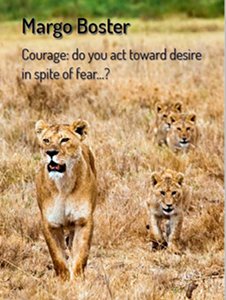 Guest post by Margo Boster.
Guest post by Margo Boster.
Leadership takes courage. Whether leading a company, a division, a team or just yourself, it requires courage to continually “put yourself out there” and take the lead. So what is your motivation to lead?
Marketers and advertisers learned long ago that people are motivated to move toward pleasure or away from pain. We have all seen the advertisements where, with doom and gloom, the worst case scenario is portrayed, heavy music playing in the background, lingering to instill pain in you that “this could happen to me!” Their product then swoops in to rescue you, sending you on a journey toward pleasure. Their goal, of course, is to motivate you to buy their product.
Fear or Desire
We have an emotional association for everything that we attach to pleasure or pain. Many of our decisions are based on either desire or fear – desire to move toward something or fear of what might be. What is your basic motivation – Fear or Desire?
When putting together your annual business plan, are you operating out of DESIRE for incredible growth or because you FEAR the company may fail?
Are you working hard because you DESIRE to produce outstanding work or because you FEAR what may happen if you don’t?
When you do something special for your partner, do you do it because you DESIRE to please them or because you FEAR they may be mad or displeased if you don’t?
If you are a single parent, when you are “nice” towards your child, are you doing it because you DESIRE to help them grow to be the best adults they can or because you FEAR they will go live with the other parent?
The list of choices we make every day goes on and on. Have you stopped to think about what is driving your decisions? Psychologists have spent considerable time describing different theories of motivation – instinct theory, incentive theory, drive theory, arousal theory, humanistic theory and self-determination theory, among many. Daniel Pink gained worldwide recognition by promoting the Drive Theory (internally focused) over Incentive Theory (externally focused). Regardless to which theory one subscribes, a consistency that I have found is that motivation – whether internally or externally focused – comes down to either Fear or Desire.
 I recall a client who was looking to expand his business. A previous expansion had not gone as expected, so he was more deliberate in making decisions. Throughout our coaching sessions, I noticed a recurring pattern weaving throughout many aspects of my client’s decisions. His father had been a wildly successful businessman. Suddenly, due to political unrest in the country in which they lived, the family lost everything – the business, the home, the servants – everything, except themselves. The father later tried to recreate the success he had but, while he attained some level of success, it was never to the standard that he had previously experienced.
I recall a client who was looking to expand his business. A previous expansion had not gone as expected, so he was more deliberate in making decisions. Throughout our coaching sessions, I noticed a recurring pattern weaving throughout many aspects of my client’s decisions. His father had been a wildly successful businessman. Suddenly, due to political unrest in the country in which they lived, the family lost everything – the business, the home, the servants – everything, except themselves. The father later tried to recreate the success he had but, while he attained some level of success, it was never to the standard that he had previously experienced.
This was a significant driver for my client. In his mind, doom was always just a moment away, therefore he must make decisions based on the fear of loss rather than the desire to grow. Of course, we must learn from our experiences and we must be aware of realistic risks. But these are different from continually keeping an eye on the past, on the fear, as we try to move forward.
Wherever you look, there you go
Years ago, when learning to snow ski, my instructor said, “Wherever you look, there you go.” That is true whether on snow skis, riding a motorcycle, or in a car. It is also true in our businesses or in our life. If we are keeping our eye on the fear, that is the direction we will go. If we keep our eye on what we desire, that is the direction we will go.
Another client was hired in a very senior position at a large company. The CEO was known for making unreasonable demands and often being extremely reactive when things didn’t go as he thought they should. My client was a seasoned executive with an impressive history of success; however, this position was at a higher level in a more impressive company than his previous experience. He operated continually on fear. What if he failed? What if he lost his job? What if the CEO wasn’t pleased? Rather than focus on the desire to make the organization that he ran wildly successful, he continually operated in fear. Rather than stand up and say “Here’s what we need to do,” he continually reacted from the place of fear. Unfortunately, in the end, he did fail. The CEO wasn’t pleased and he lost his job. However, he has learned – as they often say – hindsight is 20/20. In his next job, he is aware of the basis for his decisions and respond accordingly. He brings consciousness to his decisions and he is even more successful now than he could have previously imagined.
I encourage you, when confronted with challenges, to ask yourself truthfully: “Am I operating from desire or fear? Am I moving toward what I desire or away from fear?”
What if I look like a fool?
 Being aware doesn’t always guarantee we will make the right choice. I recently attended a high-powered conference with some of the top experts in their fields. Throughout the day, there were a number of “Hot Seat” opportunities where members from the audience would receive one-on-one advice and coaching from the experts. “How exciting!” I thought. “Just imagine what I can learn and gain from the experience!” I was filled with the desire to learn and expand my potential. Wow! As the day wore on and the time for the Hot Seat opportunities drew closer, fear overcame me. “Oh no!”, I thought. “What if I’m not as good as the other participants in the room? What if I look like a fool?” Fear won out and I did not volunteer for the Hot Seat. I missed out on receiving incredible coaching from one of the leading experts in the field.
Being aware doesn’t always guarantee we will make the right choice. I recently attended a high-powered conference with some of the top experts in their fields. Throughout the day, there were a number of “Hot Seat” opportunities where members from the audience would receive one-on-one advice and coaching from the experts. “How exciting!” I thought. “Just imagine what I can learn and gain from the experience!” I was filled with the desire to learn and expand my potential. Wow! As the day wore on and the time for the Hot Seat opportunities drew closer, fear overcame me. “Oh no!”, I thought. “What if I’m not as good as the other participants in the room? What if I look like a fool?” Fear won out and I did not volunteer for the Hot Seat. I missed out on receiving incredible coaching from one of the leading experts in the field.
Even with awareness and practice, we can still sometimes succumb to fear. But that’s okay – just acknowledge it, recognize what you lost from it, and refocus on moving toward your desires. Fortunately for me, desire prevails much more often than fear.
Courage is often defined as, not the absence of fear, but action in spite of fear. I think that courageous leadership is recognizing when your motivation is fear, and instead moving toward your desires.
Reflection questions
- What is your basic motivation – Fear or Desire?
- What would you like to achieve this year?
- Is there a fear holding you back?
- How can you acknowledge the fear but act courageously nevertheless?
- How can you move toward your desire?
Margo Boster is co-founder of ImpaQ Solutions. As a leadership strategist, Margo works with leaders, organizations and teams to be more effective and achieve goals. She is also an RYT Yoga teacher and divides her time between Scottsdale, Arizona and the Washington, DC area. www.impaq-solutions.com
Marcella Bremer is an author and culture & change consultant. She co-founded this blog and ocai-online.com.
